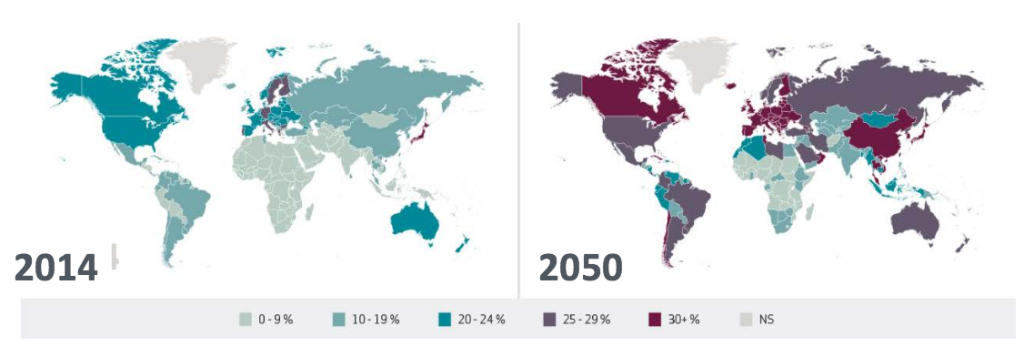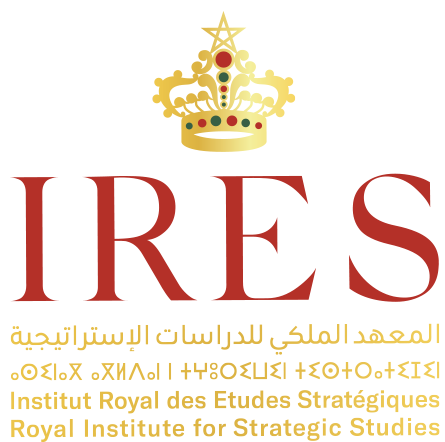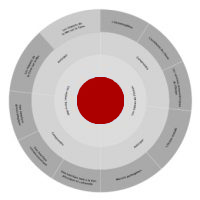ANNUAL SURVEY PAPER 2023
DETERIORATING MENTAL HEALTH
- 09/10/2023
Mental health*State of psychological and cognitive well-being that enables optimal management of various aspects of life. It is often altered by “a complex set of individual, social and structural pressures and vulnerabilities”.
Source: World Health Organization. “Mental health: strengthening our action”. June 2022.
https://www.who.int/fr/news-room/fact-sheets/detail/mental-health-strengthening-our-response/ or mental well-being enables people to cope with life’s stresses, make the most of their abilities, learn effectively, work and contribute to their communities. It is an integral component of health and well-being, and underpins individual and collective abilities to make decisions, build relationships and shape the world we live in.
According to the WHO, mental disorders afflict over 450 million people, and rising, driven by a combination of the stresses of daily life, social and economic pressures, conflict, natural disasters (eco-anxiety) and more recently, the Covid-19 pandemic.
This global deterioration in mental health is further exacerbated by the stigma surrounding mental disorders, limited access to care, and an increased prevalence of problems associated with emotional well-being.
The issue of mental health is of particular importance in Morocco: a 2005 survey conducted jointly by the Ministry of Health and the WHO found that 48.9% of Moroccans suffered from at least one mental health disorder, with a higher prevalence among women and younger people.
EROSION OF HUMAN VALUES*
EROSION OF HUMAN VALUES*Set of values (respect, acceptance, openness, mutual aid, benevolence, empathy, …) that help forge links between people, touching upon each other’s humanity, thus enabling harmony in society.
Source: Graines de Paix. “Quelles valeurs humaines ?”. 2016. https://www.grainesdepaix.org/fr/ressources/sinspirer/concepts-de-paix/Facteurs-de-paix-3-idees-fortes/les-valeurs-humaines/quelles-valeurs-humaines/
- 09/10/2023
Human relations within a society are typically rooted in respect for so-called “human” as opposed to “inhuman” values, such as kindness, equity, benevolence, respect for others and their dignity, generosity, and compassion…
A host of factors dehumanize human relations today: online communication, lacking in warmth and compassion; fast-paced present-day life, leading to inconsiderate and even inappropriate behavior; techno-bureaucracy, with little compassion for those administered; socio-economic inequality, creating a strong sense of injustice… Conflicts arising from competition (economic, sporting or educational) inhibit sharing, mutual aid, and empathy, all of which are essential for effective, positive relationships between individuals.
Yet, faced with the upcoming global challenges of climate change and resource scarcity, healthier human relations are essential to building more cohesive societies, capable of withstanding escalating tensions.
Despite Morocco’s rich history of conviviality and respect, it is not immune to the negative influences of global dehumanization. Addressing these challenges issues means promoting initiatives that foster empathy, respect, and dignity among citizens.
SOCIAL MEDIA IMPACTS ON YOUNG PEOPLE
- 09/10/2023
The impact of social media*IT platform (websites or mobile applications) that enables users to communicate, network, track other users’ activities and interact in real-time.
Source: Solocal. ” C’est quoi les réseaux sociaux?”. April 2020.
https://www.solocal.com/ressources/articles/definition-reseaux-sociaux/ on young people refers to the impact of platforms such as Facebook, Instagram, Twitter, TikTok, and others on the behavior, attitudes, and well-being of young people.
Social media adoption by young people is a global trend that has surged over the past decade. According to a 2018 Pew Research Center study, 95% of teenagers in the US have access to a smartphone, and 45% are online almost constantly. Social networks have become a central aspect of young people’s lives, shaping their social interaction, access to information, and social contribution.
While social networks facilitate learning, civic engagement, and creativity, they also can fuel problems ranging from cyberstalking to misinformation, screen addiction, and deteriorating mental health. Hence the emphasis on healthy, responsible use of social networks.
Young Moroccans are not immune to the popularity of social networks: in 2022, for instance, 60% of Morocco’s 19 million Facebook users were aged 18 to 34. It is therefore vital to strike a balance between the real and online worlds, to preserve and promote the health and well-being of younger generations – the foundation of present and future development.
In this respect, it might be appropriate to devise a specific Social Media policy, ensuring balance between freedom of expression and preservation of public order.
INFLUENCERS
- 09/10/2023
influencers*Social media content creator who has a strong following and who shares his or her opinions, activities, and consumer habits, thereby influencing his or her followers.
Source: E-marketing.fr. “Influenceurs : définition, objectifs et salaire “.
https://www.e-marketing.fr/Definitions-Glossaire/Influenceurs-304209.htm/, often major players in digital marketing, are people who, via their prominent presence on social networks, exert considerable influence on their followers, potentially shaping opinions, purchasing behavior, and consumer trends.
The influencer phenomenon is exploding worldwide: worth $1.7 billion in 2016, influencer Marketing’s market size hit $16.4 billion in 2022 and is projected to reach $21.1 billion in 2023, for a 29% increase.
While influencers can play a positive role for Internet users, there are growing concerns about this activity: unrealistic standards and comparisons; promotion of materialism and consumerism; lack of authenticity and transparency; misinformation and pseudoscience; unethical practices… It is therefore essential to preserve the integrity and authenticity of influencer marketing, for consumers and brands alike.
Morocco is squarely impacted by this emerging trend: 75% of Internet users follow influencers on social networks; some 60,000 Moroccan influencers (up from only 1,400 in 2018) play an expanding role in promoting local and international brands, generating sales of €300 million. Moroccan companies have also started to leverage content creator influence to reach target audiences more effectively.
THE PLACE OF WORK
- 09/10/2023
The “place of work” relates to the importance and role of work in the lives of individuals and society (both paid and unpaid work including domestic work and voluntary work). Work contributes to personal identity, economic subsistence, social participation, and self-realization.
Technological, economic, and social changes have transformed the nature of work, with a rise in remote working, self-employment, and precarious employment. At the same time, developments in the status of women call into question their sometimes disproportionate role in unpaid work. Work’s place in society is therefore in a state of flux, raising questions about work-life balance, gender equality, job security, and social protection.
Younger generations (millennials, Gen Z, …), nearly 30% of the global workforce by 2025, have developed new aspirations and priorities for their work environment: more humanity, empathy, inclusiveness, equality, and respect, all of which employers should take into account to prevent destructive turnover (war for talent).
Creating decent jobs, valuing unpaid work, and guaranteeing people’s well-being and fulfillment at work will all be essential.
The Kingdom is all the more confronted with this issue in light of its sizeable younger population (16.2% of the total 2021 population is aged 15 to 24) and changing labor market, with greater weight attributed to the service sector, informal employment, and migration.
Faced with youth unemployment and workplace gender inequality, Morocco should embrace the opportunity offered by universal social protection to incorporate the informal sector and considerably reduce job insecurity.
CHALLENGING CONSUMERISM
- 09/10/2023
Consumerism*Consumption or utilization that outstrips renewable resources, leading to the risk of shortage.
Source: La langue française. “Surconsommation”.
https://www.lalanguefrancaise.com/dictionnaire/definition/surconsommation/, or the act of consuming beyond one’s immediate needs, is a growing global concern. As environmental and social impacts grow, it is essential to question excessive consumption.
Overconsumption has, since the end of the Second World War, led to unprecedented levels of natural resource depletion, massive waste production, and the emergence of severe environmental problems including climate change, plastic pollution and ecosystem degradation. It has also generated greater socio-economic disparity and household debt.
Consumers are changing, reflecting a growing awareness of the unsustainability of this model: consumer demands and empowerment are on the rise, as is consumer responsibility and resistance. Movements such as Enoughism and Minimalism have emerged with one clear principle: living with fewer goods does not imply living worse.
With rising educational levels, skills, and standards, Moroccan consumers are no longer passive agents in their relationship with consumption. The unprecedented and strongly supported 2018 boycott movement in Morocco is a case in point.
AGING GLOBAL POPULATION
- 09/10/2023
Worldwide population aging describes the growing proportion of older people, generally defined as those aged 65 and over, in the total population. This is driven by rising life expectancy and declining birth rates across a wide range of countries.
The WHO predicts that the global population of people aged 60 and above will have doubled to 2.1 billion, by 2050. The number of people aged 80 and above is expected to triple from 2020 to 2050, reaching 426 million.
Population aging is a complex issue. On one hand, it puts pressure on healthcare and pension systems, impacts the economy and labor market, and entails adjustments across a number of areas, from urban planning to technology.
On the other hand, the contribution of older people to society should be recognized and valued. It is, therefore, crucial, going forward, that we promote healthy, active aging and guarantee the rights and well-being of the elderly.
In Morocco, the High Commission for the Plan estimates that in 2021, 11.7% of the total population is aged 60 and above (nearly 4.3 million people), compared to 8% in 2004 (2.4 million). The High Commission for the Plan’s demographic projections predict that “by 2030, the number of people aged 60 and over will have risen to just over 6 million, a 42% increase over 2021, and will account for 15.4% of the population”.


